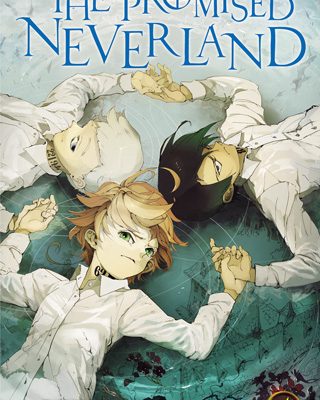
The Promised Neverland recently concluded in Weekly Shounen Jump, and it caps off a four-year run as perhaps my favorite dedicated shounen manga of the last twenty years. It both elevates and challenges the foundational Jump motto of “Friendship, Hard Work, and Victory” by pushing far past simple power fantasies and the thrill of adventure. It dives deep into the territory of political thought as it tells an intriguing story about kids trying to both survive and make a difference in their world.
This is not the first time I’ve praised The Promised Neverland. I’ve previously written about the significance of its main heroine, Emma, and the fact that the series criticizes the entrenched systems of injustice that stay in power by pitting people against one another. Now that the series has crossed the finish line, I feel that my positive opinions of the manga have been more than justified. The Promised Neverland is a series that dares to say something about the world, utilizing its world and its characters to challenge readers to imagine a better world.
The Promised Neverland places a female protagonist front and center, gives her the agency to make changes, and emphasizes the idea that we don’t have to perceive the world as some zero-sum game of absolute winners and losers—a world where the first thing we ask is how we can save as many people as we can, and not how many people we need to sacrifice to achieve a goal. Here and now in the year 2020—between COVID-19, Black Lives Matter, democratic protests in Hong Kong, and countless other human rights and safety issues—these are messages we need.
An opinion I keep seeing online is that The Promised Neverland was at its best in the first arc, when it was about orphans trying to outsmart their sinister and powerful mother figure in order to escape. And certainly, there was a kind of thrill to the “high stakes battle of wits” that defines the early manga. However, I am so glad that The Promised Neverland evolved past that point. It would have been all too easy for this manga to simply be about the nerve-racking excitement, but it became a genuine piece of thought-provoking science fiction—the kind that encourages readers to imagine a different world, one that looks at concepts of utopia and dystopia, and asks how one could turn into the other and vice versa.
There is another Shounen Jump series that I feel hits with a similar weight, though it’s a far different series in a lot of ways: Barefoot Gen, the story of two siblings who live through the bombing of Hiroshima and the pain of post–World War II Japan. No, The Promised Neverland is not couched in the trauma of directly experiencing a nuclear explosion, and its pain is abstracted through its fantastical setting, but it still looks deep into who we are as a collective people called humanity, and challenges us all to be better.








